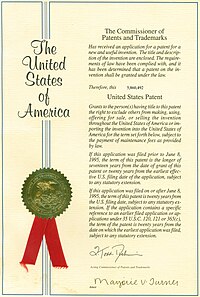
Photo from wikipedia
BackgroundDespite the significant impact of pharmaceutical innovations on healthcare, our understanding is still limited because previous studies explored only a few cases and largely came from a linear perspective. This… Click to show full abstract
BackgroundDespite the significant impact of pharmaceutical innovations on healthcare, our understanding is still limited because previous studies explored only a few cases and largely came from a linear perspective. This study presents a detailed case of the Chinese and U.S. pharmaceutical patents and investigated advancements that the global pharmaceutical industry is experiencing. A network analysis approach was used to identify certain aspects regarding the diffusion of pharmaceutical innovations, including innovation attributes, adopter characteristics, and clustering.MethodsBased on a patent database, network analysis and visualization, this study captured the structure of patent networks for the global pharmaceutical landscape in a large set of patents. A large volume of patent data, 15,422 patent filings citing Chinese pharmaceutical patents, 28,075 citing U.S. patents, and 6064 citing both Chinese and U.S. patents during 2014–2015, were retrieved from the world patent database, Derwent Innovation Index. The networks reveal many interesting features of technological innovation, convergence trends and diffusion patterns.ResultsConvergence innovations were identified, with the advantage and influence of U.S. patents shown in a variety of areas, and their Chinese counterparts were concentrated in traditional Chinese medicine. Early adopters of Chinese patents were mainly universities within the national sector, while early adopters of U.S. patents were academic institutions and large international pharmaceutical corporations of balanced quantity, contributing a higher degree of technology convergence. Technology convergence in the cancer-treatment sector is expected to have a high future development potential.ConclusionChinese and U.S. pharmaceutical innovations contributed differently to the growth and development of the global pharmaceutical industry. The findings of this study can provide rich knowledge about the influence, diffusion and convergence trends of Chinese and U.S. pharmaceutical innovations. In the pharmaceutical industry, the findings may provide implications for researchers, policy makers, health professionals, and the general public to help improve the overall health of society.
Journal Title: Globalization and Health
Year Published: 2018
Link to full text (if available)
Share on Social Media: Sign Up to like & get
recommendations!